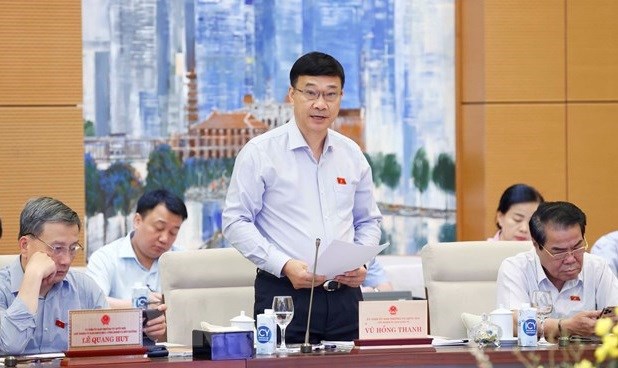NA Standing Committee scrutinises draft amended Petroleum Law
The National Assembly (NA) Standing Committee gave opinions on the explanation, acquisition and revision of the draft Petroleum Law (amended), during its on-going monthly law-making session on August 16.
 Chairman of the NA’s Committee for Economic Affairs Vu Hong Thanh speaks at the session. (Photo: VNA)
Chairman of the NA’s Committee for Economic Affairs Vu Hong Thanh speaks at the session. (Photo: VNA)Delivering a report on the explanation, acquisition and revision of the draft law, Chairman of the NA’s Committee for Economic Affairs Vu Hong Thanh said that many have suggested adding midstream and downstream oil and gas exploration and exploitation activities to the scope of the amendment of the draft law.
Thanh said that upstream oil and gas exploration and exploitation activities are closely linked with the fields of defence, security and foreign affairs. Therefore, it is necessary to have a separate provision in this law.
Speaking at the session, NA Chairman Vuong Dinh Hue appreciated efforts of the drafting agency - the Ministry of Industry and Trade, the legislature's Committee for Economic Affairs and relevant agencies - in the study and acquisition of opinions of deputies at the legislative body’s third session to complete the draft law with a high quality.
He suggested the report on verification of the draft law review the overall objectives, viewpoints and major policy orientations.
 NA Chairman Vuong Dinh Hue (C) (Photo: VNA)
NA Chairman Vuong Dinh Hue (C) (Photo: VNA)The draft law should also clarify the stance of the economisation of the natural resources industry; the management, exploitation and use of petroleum survey database; and the principles of using funds for the basic survey. It should ensure consistency among the provisions of the draft law.
Regarding the approval of oil and gas contracts, the NA Chairman said that the contracts are very important, bind the responsibilities and obligations of the parties, can last for decades during which disputes and risks may arise. He suggested this kind of contract be approved by the Prime Minister.
Agreeing with the top legislator’s ideas, Minister of Industry and Trade Nguyen Hong Dien said that a petroleum contract is a legally binding agreement between the State and an investor (petroleum contractor) with a very long term (often more than 30 years), with many specific contents related to national defence, security, sovereignty, and sea surface.
In addition, the terms of oil and gas contracts are closely related to each other, so it is difficult to distinguish between the main and the auxiliary terms.
Therefore, the regulation of the Prime Minister's authority to approve the entire oil and gas contract is in line with the reality of oil and gas exploration and exploitation activities in Vietnam, the minister affirmed.
The Law on Petroleum was first introduced on July 6, 1993, and revised in 2000, 2008 and 2018. Together with guiding documents, it has been facilitating the development of the oil and gas industry. However, there have been a number of challenges emerging in the enforcement of the law. For examples, there are major gaps between several provisions and the changing reality as well as the robust growth of the energy sector at present. Some parts of the law are also not consistent with related laws and regulations.
A draft revised law on oil and gas was first submitted for discussion at the third session of the 15th National Assembly, aiming to build a law more relevant to the current situation and enhance the effectiveness and efficiency of State governance in the field. The revision also seeks to provide a more unified regulatory framework and remove legal barriers for investors.
The amended Petroleum Law is scheduled to be tabled for discussion again and adopted at the upcoming fourth session of the 15th National Assembly slated for October 20./.













